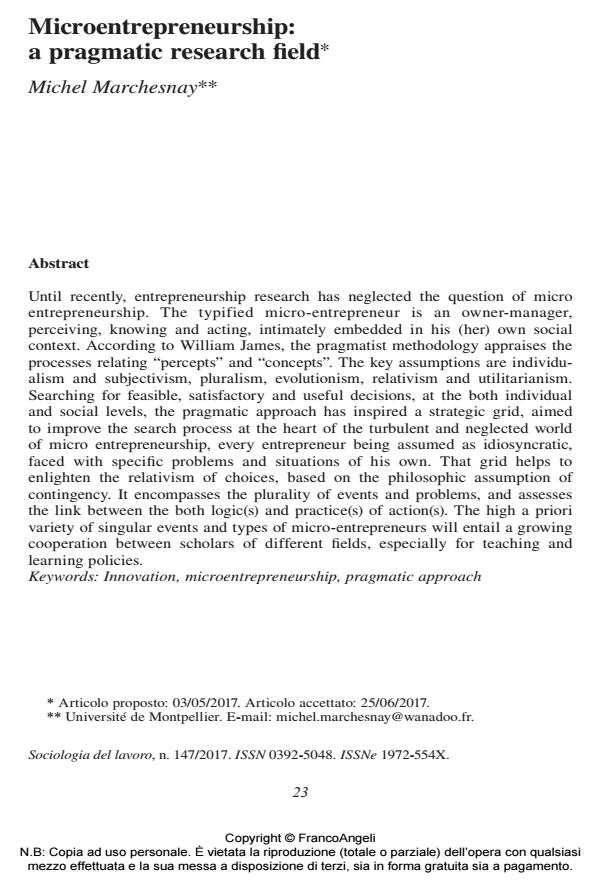Microentrepreneurship: a pragmatic research field
Titolo Rivista SOCIOLOGIA DEL LAVORO
Autori/Curatori Michel Marchesnay
Anno di pubblicazione 2017 Fascicolo 2017/147 Lingua Inglese
Numero pagine 18 P. 23-40 Dimensione file 121 KB
DOI 10.3280/SL2017-147002
Il DOI è il codice a barre della proprietà intellettuale: per saperne di più
clicca qui
Qui sotto puoi vedere in anteprima la prima pagina di questo articolo.
Se questo articolo ti interessa, lo puoi acquistare (e scaricare in formato pdf) seguendo le facili indicazioni per acquistare il download credit. Acquista Download Credits per scaricare questo Articolo in formato PDF

FrancoAngeli è membro della Publishers International Linking Association, Inc (PILA)associazione indipendente e non profit per facilitare (attraverso i servizi tecnologici implementati da CrossRef.org) l’accesso degli studiosi ai contenuti digitali nelle pubblicazioni professionali e scientifiche
Until recently, entrepreneurship research has neglected the question of micro entrepreneurship. The typified micro-entrepreneur is an owner-manager, perceiving, knowing and acting, intimately embedded in his (her) own social context. According to William James, the pragmatist methodology appraises the processes relating "percepts" and "concepts". The key assumptions are individualism and subjectivism, pluralism, evolutionism, relativism and utilitarianism. Searching for feasible, satisfactory and useful decisions, at the both individual and social levels, the pragmatic approach has inspired a strategic grid, aimed to improve the search process at the heart of the turbulent and neglected world of micro entrepreneurship, every entrepreneur being assumed as idiosyncratic, faced with specific problems and situations of his own. That grid helps to enlighten the relativism of choices, based on the philosophic assumption of contingency. It encompasses the plurality of events and problems, and assesses the link between the both logic(s) and practice(s) of action(s). The high a priori variety of singular events and types of micro-entrepren eurs will entail a growing cooperation between scholars of different fields, especially for teaching and learning policies.
Fino a poco tempo fa, la ricerca sull’imprenditoria ha trascurato la questione della microimprenditorialità. La tipizzazione del microimprenditore è quella di un proprietario-manager percepito, conosciuto e attivo in relazione al profondo radicamento nel suo contesto sociale di appartenenza. Secondo William James, la metodologia pragmatica valuta i processi che riguardano le "percezioni" e le "concezioni". Gli assunti chiave sono l’individualismo e il soggettivismo, il pluralismo, l’evoluzionismo, il relativismo e l’utilitarismo. Cercando le decisioni praticabili, soddisfacenti e utili, a livello individuale e sociale, l’approccio pragmatico ha ispirato una griglia strategica volta a migliorare il processo di ricerca sugli aspetti cruciali del mondo, turbolento e trascurato, della microimprenditoria. Ogni imprenditore è assunto come idiosincratico di fronte a propri specifici problemi e situazioni. La griglia strategica proposta aiuta a comprendere il relativismo delle sue scelte, basandosi sull’assunto filosofico della contingenza. Essa comprende la pluralità di eventi e problemi e valuta le relazioni reciproche tra la logica e la pratica dell’azione. L’elevata varietà che, a priori, connota la microimprenditorialità richiede un approccio basato su una crescente collaborazione tra campi disciplinari, anche nell’ambito dell’insegnamento.
Keywords:Innovazione; microimprenditorialità; pragmatismo
- Dewey J. (1987). Art as Experience. Carbondale: Southern Illinois University Press.
- Dewey J. (1976-1983). The Middle Works, 1899-1924. 15 vol., Carbondale: Southern Illinois University Press.
- Dewey J. (1984). The Public and its problems. Carbondale: Southern Illinois University Press.
- Dewey J. (1986). How we think. The Board of Trustees. Carbondale: Southern Illinois University Press.
- James W. (1975a). Pragmatism. The works of William James. Cambridge: Harvard University Press.
- James W. (1975b). The Meaning of Truth. The Works of William James. Cambridge: Harvard University Press.
- James W. (1976). Essays in radical Empiricism. The works of William James. Cambridge: Harvard University Press.
- James W. (1977). A pluralistic Universe. The Works of William James, Cambridge: Harvard University Press.
- Marchesnay M. (2011). Small business and sustainable development. In: Lesca N., ed., Environmental scanning and sustainable development. London: Wiley: 77-99.
- Marchesnay M. (2017). Opportunity: from semantic concept to pragmatic tool. In: Léger-Jarniou C., Tegtmeier S., eds., Research Handbook on Entrepreneurial Opportunities. Reopening the Debate. Chetenham: Elgar: 241-260.
- Moore E.C. (1961). American Pragmatism: Peirce, James, and Dewey. New York: Columbia University Press.
- Putnam H. (1994). Pragmatism. An open Question. Oxford: Basil Blackwell.
- Rorty R. (1979). Philosophy and the Mirror of Nature. Princeton: Princeton University Press.
- Schiller F.C.S. (1907). Studies in Humanism. London: Macmillan & C.
- Sennett R. (2008). The Craftsman. New Haven: Yale University Press.
Michel Marchesnay, Microentrepreneurship: a pragmatic research field in "SOCIOLOGIA DEL LAVORO " 147/2017, pp 23-40, DOI: 10.3280/SL2017-147002